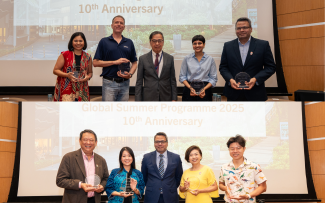
A record 347 students from 41 nationalities converged on Singapore this year for the 10th anniversary of the Singapore Management University (SMU) Global Summer Programme (GSP) from 23 June to 1 August 2025, underscoring its rise as a sought-after platform for cross-cultural learning and collaboration. For the first time, the programme ran two full sessions to meet rising global demand.
The milestone celebration, complete with a packed auditorium, lively chatter and a commemorative cake, coincided with SMU’s 25th anniversary and the 3rd anniversary of the University’s Centre for Global Education & Opportunities (GEO).
“Since its launch in 2015, the GSP has grown from a single summer course to a multi-dimensional platform that empowers students to think critically, connect globally, and lead confidently. The GSP learning experience takes on even greater importance today, in the face of AI, geopolitical rifts, and other disruptions,” said Professor Alan Chan, SMU Provost.
“GSP has become a launchpad for students to step into the future with a global perspective and a local pulse,” said Dr. Navin Rajagobal, Senior Director, SMU Academic Services & Operations.
“Seeing the Global Summer Programme reach its 10th year, with record participation and an expanded curriculum, truly reflects our commitment to nurturing globally minded talent,” added Rick Tay, Head of GEO. “We are excited to create even more opportunities for students to engage deeply with both Singapore and the world.”

Keeping Up with a Changing World
GSP 2025 held a theme of “Future and Global Ready: Skills & Trends for the Next Decade.” Describing GSP as a launchpad for students to step into the future with a global perspective and a local pulse, Dr. Rajagobal outlined three big shifts that today’s graduates must prepare for:
- The rise of AI, robotics and quantum computing, changing how we live and work.
- A shift towards circular, regenerative systems and the race to net-zero.
- The reemergence of great power rivalry, and the growing economic and demographic importance of Asia.
These themes were echoed throughout the programme and panel discussions, including in the insights shared by Michelle Khoo, Center Leader, Deloitte Center for the Edge. Drawing from her own career path, she shared: “Clients are no longer just looking for ideas — they want help executing them. There’s a shift from strategy to implementation, and consultants need to adapt.”
Encouraging students to shape their path based on curiosity and not just credentials, she commented: “Let real-world problems like inequality or disruption pull you in the direction where you can make a difference.”
In response to these global shifts, GSP introduced two new academic tracks in the past two years, Digital Intelligence and Sustainable Futures, joining the existing Asian Insights track. Together, these tracks aim to help students understand complexity and thrive in an interconnected world.

Industry Voices: What Employers Are Really Looking For
GSP goes beyond studying the future. The programme connects students with the people shaping it. Two panel discussions featured industry leaders from finance, consulting, tech and entertainment, offering firsthand insights into what they seek in tomorrow’s talent. Ted Howland, Vice President Group Sustainability, CapitaLand Investment, reflected on how sustainability careers have evolved and what skills are key:
“Sustainability is truly cross-disciplinary. We’re seeing a growing demand for roles in greening buildings, ESG reporting, and renewable energy. But beyond technical skills, communication and collaboration across fields are essential.”
He encouraged students to embrace challenges: “Tackle unusual, ambiguous projects early on — it’s the best way to build comfort with the unknown and grow resilience.”

Chiew Hui Yan, Chief Accounting Officer for IDEMIA (APAC & EMEA), spoke about how finance roles are evolving with technology: “Finance used to be a back-office function. Now, it’s at the centre of decision-making. You need to be able to tell stories with numbers — to think forward, not just look backward.”
She urged students to stay bold and keep experimenting: “Be bold and be curious. Try. Fail. Repeat. Experience is the best teacher.”
The conversation also underscored what tech alone can’t replace, judgment, cultural intelligence, emotional awareness, and the ability to ask the right questions.
Learning Beyond the Classroom: Immersive Experiences That Inspire
This year’s GSP edition saw students diving into Singapore’s vibrant innovation ecosystem and rich cultural tapestry through carefully curated industry visits and hands-on workshops. From engaging with industry leaders from Bosch, Dell, OCBC, and Keurig Singapore, to immersing themselves in Singapore’s urban development and heritage, the programme brought learning to life.
Students visited the Monetary Authority of Singapore Gallery to deepen their understanding of Singapore’s financial history and regulatory landscape, experienced local storytelling at a Singaporean film screening, and even tried their hand at traditional porcelain art with a Singapore heritage brand, Luzerne.
Beyond corporate visits, GSP allowed participants to partake in peer-led workshops in archery and roller-blading which fostered leadership and community spirit, while sessions on 3D printing offered a glimpse into future technologies. These real-world encounters complemented classroom learning, helping students bridge theory and practiceand build the confidence to thrive in tomorrow’s world.

Looking ahead to the next decade, and beyond
Marking its 10th anniversary, GSP looked ahead with expanded sessions, new learning tracks and deeper industry ties, positioning the programme to keep pace with global shifts while delivering an exceptional summer in Singapore.

Here’s to the next decade of conversations, curiosity and classrooms filled with possibility.
Learn more about the Global Summer Programme (GSP) here.
Photo credit: GEO, SMU